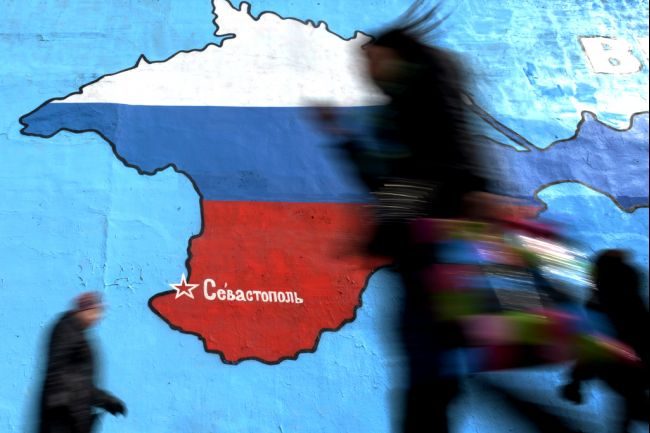“Today we are all Ukrainians” – the Baltic elites repeatedly supported official Kiev, stressing that the Ukrainian crisis is none other than “hybrid war”, threatening, among other things, the independence of Latvia, Lithuania and Estonia. To facilitate national security, the “Baltic sisters” increased their military spending, yet Latvia became the pioneer in combating “contras” and Donbas “terrorists” associates inside the country by urgently adopting several repressive laws.
The Novorossiya Innovation
On 12 February, at the time when representatives of Germany, France, Russia and Ukraine during the Minsk meeting were looking for the possibility of peace settlement in the armed conflict in the Southeast, in the final reading the Saeima of Latvia adopted amendments to the Penal Code, imposing imprisonment for active (direct or indirect) participation of Latvians in armed conflicts abroad. From now, “participation in armed conflicts abroad, their financial and material support, recruitment, training and transporting of Latvian residents to a conflict zone” will be the subject of imprisonment up to 10 years with the consecutive three-year control by the law enforcement agencies.
To strengthen national security, the legislators offer to update Section IX of the Criminal Law “Crimes against Humanity and Peace, War Crimes and Genocide” with three new articles:
77.1. Unlawful participation in an armed conflict;
77.2. Financing of an armed conflict.
77.3. Recruitment, training and transporting to an armed conflict.
66 MPs voted to adopt the amendments, 18 members of the opposition Harmony fraction abstained. Nobody voted against. The amended law will enter into force after its declaration by the President.
The question remains open on how necessary is this norm, and against whom can the repressive amendment be employed? Latvia’s Security Police (SP) still doesn’t report the concrete number of the country’s residents, participating in military actions in Ukraine’s Southeast on the side of self-declared republics. According to public information, previously confirmed by the SP, four Latvians are fighting with the rebels: infamous Nationalist Bolshevik Beness Aijo and three Ludza residents. However, the real amount of volunteers can be bigger.
With that said, in Latvian media, unlike the abundance of news about the dark-skinned “terrorist” Beness, the information about residents participating in the armed conflict on the Ukrainian side rarely surfaces. The exception is the interview of the Latvian Delfi reporter in the late 2014 with a volunteer called Arturs, fighting along the government forces, in the ranks of the infamous Aidar Battalion, guilty, according to the Amnesty International report, of array of war crimes (abductions, unlawful arrests, theft, extortion and, possibly, murders) during the military actions in Luhansk Region.
We can underscore the simple result. The amount of Latvian citizens, actually participating in military actions on the territory of Ukraine, is very little, and they aren’t capable of posing any significant threat to national security, while the “separatists from Ludza” are already facing charges under Articles 88.2 (calling for terrorism) and 88.3 (recruitment to conduct terrorist attacks).
Rihards Kozlovskis (Unity Party), the head of Latvia’s Interior Ministry:
“Currently not one person, who took part in the Donbas events, was apprehended. But the new law, in the development of which the MIA work group participated, provides broad opportunities for bringing such persons to responsibility. In turn, the so-called collecting the humanitarian aid for the people of Donbas is a provocation too. In collecting the aid one has to collaborate with the Red Cross, otherwise it’s unclear who gets the goods”.
Who Will We Judge?
The range for repressions and deliberate legal sloppiness of the new law are noted in the of the amendments that are directed, among other things, at “limiting the financing, informational campaigns and other sorts of support of the persons participating in a conflict.” The implementation of the ambiguous norm is also applied to the persons physically not present at combat zones, but, for example, remaining in Latvia, while somehow “actively participating” in a conflict.
It is exactly the pettifogging definition of the “active participation” that will allow to turn the new Article 77 of the Latvian Republic Criminal Law into the famous Stalinist Article 58 of the RSFSR Criminal Code. Onwards everything only depends on the interpretation of the vague legal definition by the entitled institutions. It turns out, to get 10 years in prison, you don’t necessarily have to be in Debaltseve with a gun in your hands, because the post “Crimea is ours” in a personal blog is simply enough for the “informational campaign in aiding the terrorists”? Or canned mushrooms sent to relatives in Luhansk? With a proper creative approach, this too can be qualified as material aid to a side participating in an armed conflict.
I get the impression that the amended Criminal Law was written not for some good preventive measures, which are listed in the amendments’ annotation, and not even for the dozen men, defending their ideas with weapons on the Ukraine’s Southeast on the both sides of the front, but for a particular group of Russian-speaking community leaders, enthusiastically embracing Crimea’s accession to Russia and publically endorsing the actions of the Russian leadership in the context of the crisis in Ukraine.
Thus, the recently appointed head of the Security Police Normunds Mežviets, apparently, under the fuss of “hybrid war” with Russia in the region, decided to finally crush the Russian “fifth column” in Latvia. In January, the SP spokespersons informed the media “that the state security services must have bigger legal powers to battle such risks (exposing “active participators” in Ukrainian crisis” – RuBaltic.Ru note), and for this we have to improve and update the legal regulations”, adding that they need to “enact preventive measures for more effective prevention of the threats to democratic values, as well as state security and the security of society, which can be posed by Latvians, participating in politically-motivated conflicts outside Latvia.”
Earlier SP also accused the organization “World Without Nazism” of participating in promo-events for the support of Russia in Crimea. And if so far it didn’t succeed in initiating criminal procedures against the human rights activists and anti-fascists under “terrorist” articles, like it did regarding the people collecting humanitarian aid from the NGO “Baltia”, the new amendments significantly broaden the spectrum of instruments for fighting those, who exercise the freedom of speech, expressing viewpoints on the events in Ukraine, differing from the official Latvian dogma.
Apparently, the Criminal Law amendments, lobbied by the Latvian “knights of cloak and dagger”, will be used against this group of people. With that, neither the belligerent statements of the Latvian Foreign Minister Edgars Rinkēvičs, aimed at the escalation of the Ukrainian crisis, nor the nationalists’ calls to supply Kiev with lethal armaments, of course, won’t be perceived as “active participation” in a conflict and won’t result stripping of mandates and criminal prosecution.
The Latvian Legal Grammar
The Latvian Criminal Law amendments create a dangerous precedent and can easily serve as a contagious example for the Baltic neighbors. Lithuania, where last week under the suspicion of sending the money collected for the expedition to the warring party in Donbas, the members of Russian digger parties, searching for the unburied remains of the Soviet warriors, got arrested, could broaden the instruments kit for battling the rebellious Ukrainian Southeast sympathizers.
Although, Lithuanians should rather design their own version of such a law, setting things straight and excluding double standards. They should define from the start that criminal prosecution is applied exclusively to Lithuanians, sympathizing the unrecognized republics, while those who support Kiev must be obligatorily awarded with state decorations.
Because if Lithuania will copy the Latvian version with the “active participation in an armed conflict abroad” formula, they would be forced to strip of mandates and imprison the half of the official Vilnius, fronted by the Defense Minister Juozas Olekas, who admitted supplying Kiev with “elements of armaments.” So the initiative, supported by the Ukraine’s Verkhovna Rada in late January, privately recognizing the DPR and LPR as terrorist organizations, equating the residents of Donetsk and Luhansk regions to the ISIL militants, would suit Lithuania “perfectly”.
Such measures can easily be picked up by Poland, whose secret services already began actively spying on its own citizens, engaging in the Ukrainian conflict, bringing criminal cases against them. Despite the charges being pressed under Article 141.1 of the Polish Criminal Code (“serving in a foreign army, foreign paramilitary unit”), of course, we are talking about the supporters of the self-declared republics, because the Ukrainian Defense Minister Stepan Poltorak had promised the foreigners fighting alongside Kiev to personally assist in acquiring Ukrainian citizenship. So, Polish and Lithuanian secret services are unlikely to succeed in curbing their own citizens, defending the “independence” of Ukraine with weapons. And, I guess, they didn’t really want to. The “terrorists’ associates” are about to get it instead.







